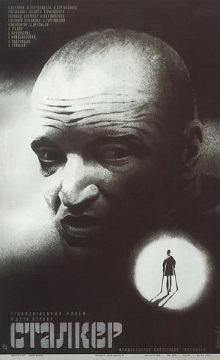
As a fan of the STALKER videogames who went on to read the novel Roadside Picnic, I’ve been looking forward to watching this film for a while now, especially given director Andrei Tarkovsky’s glowing reputation. Our cinephile friend in particular thinks highly of Tarkovsky’s work and has recommended this film to us in the past.
The beginning of the film does correspond pretty closely to what I had in my mind. An experienced “stalker” is hired by a scientist and a writer to act as their guide into the Zone, a dangerous area created by unknown forces. They need to evade the police cordon around the Zone to reach a place known as the Room in heart of the Zone and rumor holds that whoever succeeds will be granted their greatest wish.
These early scenes are filmed in sepia-tone monochrome, so much so that it looks almost black-and-white. But after a lengthy journey, the camera pulls away from the worried faces of the group of travelers and we see the Zone itself in full color glory. As my wife remarked, the one thing you can’t begrudge this film is its awesome setting. That and the director’s masterful use of lighting to make the most of it. The crude, pock-marked walls pulse with so much textural detail that they almost seem alive. Everyday objects floating in murky water take on poetic resonance. You can’t help but marvel at how the production team managed to find such an interesting, and so appropriate, location to film.
But as the film and the journey into the Zone continues, differences between this version and the book become evident. The stalker uses the familiar trick of throwing small objects like iron nuts and rocks to ensure that the path ahead is clear. But nothing untoward ever happens. The jumpier and the more nervous the stalker gets, the more annoyed and skeptical the other two, especially the writer, becomes. The characters are never named, remaining as the Coursera film course’s professor would say, types.
With so little else going on, our attention is focused on their conversations about the nature of the Zone and about their individual motivations for making the trip. It is tempting to classify the scientist as the voice of science and reason, the writer that of art, and leaving the stalker through his words and actions as oddly the voice of faith. But the types don’t quite match up perfectly and indeed towards the end, it becomes almost impossible to differentiate between their points of view at all. Others may perhaps perceive some nuggets of wisdom in the dialogue, but I’m not convinced that it’s anything more than ice-cream koans.
It’s a languorous film as well. The camera lingers over shots for so long that you start to wonder if maybe you’re missing something. Over and over again, the stalker warns of profound danger and the group proceeds cautiously and slowly, one step at a time, debris crunching audibly beneath their feet. Yet nothing happens and there is no pay-off. You once again wonder if there is a message in this as well. When asked why he had made the beginning of the film so slow, Tarkovsky apparently replied that he wanted to give enough time for the people who had wandered in by mistake to get out again.
Reading around its many rave reviews, I wasn’t able to find any consensus about what it means. Certainly there are many possible interpretations, including even an environmentalist one in the wonder and magic of a land that humans have deserted. That one is especially ironic given some claims that this production ultimately killed Tarkovsky and some of his crew members because they filmed some of the scenes at a chemical plant that emitted toxic waste. For my own part, I could perceive no deep meaning in it and feel especially cheated that it completely abandoned the true horror that forms the core of the novel.
So I have to chalk this down as one of those arthouse film that I just didn’t get. It has mesmerizing images to be sure, and a setting that just oozes atmosphere and mood. It’s no wonder that it inspired the videogame. But I just don’t see why this is considered by many to be a great film.
2 thoughts on “Stalker (1979)”